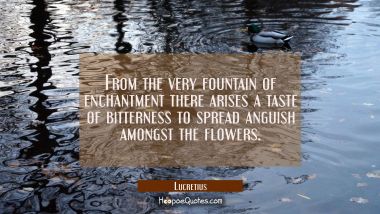
Lucretius
Titus Lucretius Carus (c. 15 October 99 BC – c. 55 BC) was a Roman poet and philosopher. His only known work is the didactic philosophical poem De rerum natura about the tenets and philosophy of Epicureanism, and which is usually translated into English as On the Nature of Things. Lucretius has been credited with originating the concept of the three-age system which was formalised from 1834 by C. J. Thomsen.
Enjoy the best Lucretius picture quotes.
Read more about Lucretius on Wikipedia.
























![[50+ Images] Birthday Wishes for Someone Special in Your Life Quotes](/media/k2/items/cache/b1dbe5e313fb0e0a26b2b36062a36d3a_M.jpg)
